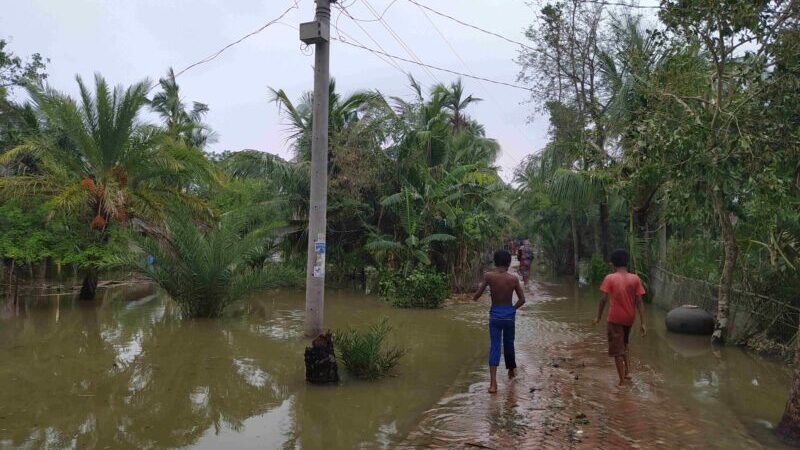A woman stands next to a cooking stove outside her home as flood waters reach above her waist.
This may be one of the most enduring images from this year’s record flooding in Bangladesh. People are trying to continue with life as normal, despite the deluge.
The monsoon rains hit the northern regions hardest, first in May, and then again in June as communities were trying to recover. Sylhet province was more than 80% underwater when flooding was at its peak.
There are many other images of people waist high in water, carrying emergency food aid, precious household items, or simply their daily belongings. This is a common and stark reminder of how climate change is impacting people’s lives in the country. The waters are rising. Low-lying areas in northern Bangladesh are prone to flooding, but this year’s downpour was the worst in Sylhet for over 120 years, according to the Department of Disaster Management.
On the other side of the country, Bangladesh’s southern shores are exposed to cyclones and storms coming off the Bay of Bengal. In a lesser reported event, high tidal surges swept through coastal districts over the summer, ruining the livelihoods of farmers and fishermen. Entire crops were lost as seedbeds became awash with seawater and salt found its way into the soil. This forced farmers to start again, buying seedlings from other regions at higher prices. Standing water is also a danger, not only destroying vegetable crops but increasing the likelihood of disease. Fishermen too were caught out by the tidal surges, which prevented them from going out to sea. This is on top of depleted fish stocks and regular cyclone warnings.
One of the impacts from these disasters is forced migration. Dhaka, Bangladesh’s capital, sits in the middle of the country, and is home to over 20 million people. This number has been growing year-on-year, in part due to new arrivals from the coasts. As hundreds of thousands of families leave their hometowns, Dhaka, and other nearby cities, are facing renewed pressure to provide for a daily influx of climate migrants.
The international aid organisation, Helvetas, works across Bangladesh to respond to the crises. Ashish Barua, Helvetas’ programme manager for climate change and sustainable development, says, “you can’t imagine how people are suffering on the ground”. He explains that supporting migrant decision-making is key. Raising awareness of safe migration routes, legal rights, and financial literacy can protect people in desperate situations from becoming exploited.
One of Helvetas’ major projects is called Panii Jibon, or “water is life”. Its aim is to improve the resilience of coastal communities to climate change. This huge undertaking supports people to change their approach to growing food and managing their water resources in response to the changing climate conditions. Each year is bringing more saltwater into crucial food and drinking water sources. One answer is to install solar-powered filtration systems which remove sand from existing ponds that store rainwater, providing access to safe drinking water. Another is to support household rainwater collection for cooking and other domestic needs.
The Panii Jibon project is in its seventh year of building climate resilience and is now working on replicating some of these solutions. But more than this, Helvetas acts as an advocate for local people: connecting local producers to sources of micro-finance; showing the government where money needs to be allocated or plugging data gaps on how communities are being affected.
The repeated floods in 2022 serve to highlight Bangladesh’s precarious position in a changing climate. While the country is a minor contributor to global greenhouse emissions, it sits on the frontline of a global crisis. Barua will be at the upcoming Cop27 conference and plans to “voice what we experience in the field and hope it is finally accepted and recognised”.
He adds that “dialogue is fine, but we need the support urgently”. The negotiations at the summit will include more urgent demands from developing countries for compensation in the face of mounting losses. The knock-on effects of climate change for Bangladesh are not only lost houses or damaged crops; in a densely populated country it is making land uninhabitable and creating dangerous levels of urban sprawl.
The Government is acutely aware of this problem but lacks the resources to take on such a Herculean challenge. It’s clear that greater assistance, and political will, is needed from the major emitters if Bangladesh is going to succeed in tackling climate disasters. As Barua notes: “We are suffering due to your lifestyle.”
Adam Wentworth is a freelance writer based in London.
Join Helvetas’ Cop27 side event on November 10, 2022.
This post was sponsored by Helvetas. See our editorial guidelines for what this means.
